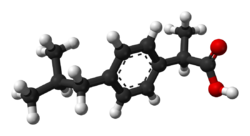Ibuprofen lysine
 |
|
 |
|
| Clinical data | |
|---|---|
| Pronunciation | /ˈaɪbjuːproʊfɛn/, /aɪbjuːˈproʊfən/, EYE-bew-PROH-fən |
| Trade names | Advil, Motrin, Nurofen, others |
| AHFS/Drugs.com | Monograph |
| MedlinePlus | a682159 |
| License data | |
| Pregnancy category |
|
| Routes of administration |
by mouth, rectal, topical, and intravenous |
| ATC code | |
| Legal status | |
| Legal status |
|
| Pharmacokinetic data | |
| Bioavailability | 87–100% (oral), 87% (rectal) |
| Protein binding | 98% |
| Metabolism | Hepatic (CYP2C9) |
| Onset of action | 30 min |
| Biological half-life | 1.3–3 h |
| Excretion | Urine (95%) |
| Identifiers | |
|
|
| Synonyms | isobutylphenylpropionic acid |
| CAS Number | |
| PubChem CID | |
| IUPHAR/BPS | |
| DrugBank | |
| ChemSpider | |
| UNII | |
| KEGG | |
| ChEBI | |
| ChEMBL | |
| PDB ligand | |
| ECHA InfoCard | 100.036.152 |
| Chemical and physical data | |
| Formula | C13H18O2 |
| Molar mass | 206.29 g/mol |
| 3D model (Jmol) | |
| Chirality | Racemic mixture |
| Density | 1.03 g/ml g/cm3 |
| Melting point | 75 to 78 °C (167 to 172 °F) |
| Boiling point | 157 °C (315 °F) |
| Solubility in water | 0.021 mg/mL (20 °C) |
|
|
|
|
Ibuprofen is a medication in the nonsteroidal anti-inflammatory drug (NSAID) class that is used for treating pain, fever, and inflammation. This includes painful menstrual periods, migraines, and rheumatoid arthritis. About 60% of people improve with any given NSAID, and it is recommended that if one does not work then another should be tried. It may also be used to close a patent ductus arteriosus in a premature baby. It can be used by mouth or intravenously. It typically begins working within an hour.
Common side effects include heartburn and a rash. Compared to other NSAIDs it may have fewer side effects such as gastrointestinal bleeding. It increases the risk of heart failure, kidney failure, and liver failure. At low doses, it does not appear to increase the risk of myocardial infarction; however, at higher doses it may. Ibuprofen can also result in worsened asthma. While it is unclear if it is safe in early pregnancy, it appears to be harmful in later pregnancy and therefore is not recommended. Like other NSAIDs, it works by inhibiting the production of prostaglandins by decreasing the activity of the enzyme cyclooxygenase. Ibuprofen might be a weaker anti-inflammatory than other NSAIDs.
Ibuprofen was discovered in 1961 by Stewart Adams and marketed as Brufen. It is available under a number of trade names, including Advil and Motrin. It was first marketed in 1969 in the United Kingdom and in the United States in 1974. It is on the World Health Organization's List of Essential Medicines, the most effective and safe medicines needed in a health system. It is available as a generic medication. The wholesale cost in the developing world is between 0.01 and 0.04 USD per dose. In the United States it costs about 0.05 USD per dose.
...
Wikipedia
